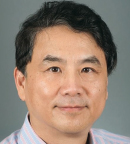Yang Shi, PhD, recently joined the Oxford Branch of the United Kingdom’s Ludwig Institute for Cancer Research. Dr. Shi, who comes to Ludwig from Harvard University, is a leader in the field of epigenetics, which explores how chemical modifications made to chromatin control the organization and expression of the human genome. Aberrations in those processes are vital drivers of cancer and underlie many other diseases and disorders.
“Yang has an outstanding track record of innovative research into the identity and mechanisms of action of chromatin modifiers,” said Xin Lu, FMedSci, FRS, Director of the Ludwig Oxford Branch. “We are delighted that he is bringing his wealth of experience, international standing, and collaborative spirit to lead our cancer epigenetics theme at Ludwig Oxford.”

Yang Shi, PhD

Xin Lu, FMedSci, FRS
Breakthroughs in Immunotherapy
Dr. Shi is widely known for his discoveries regarding methylation. In 2004, he and his colleagues identified and characterized an enzyme, LSD1, that erases methyl marks from histones. Their discovery upended a 40-year-old dogma that considered such modifications irreversible, altering long-standing models of genomic regulation.
Dr. Shi’s laboratory went on to identify many other histone-demethylating enzymes with roles in a diverse array of biologic processes. More recently, his group discovered several enzymes that methylate RNA and possibly influence the translation of gene transcripts into proteins.
Dr. Shi is applying these fundamental discoveries to the benefit of patients. His group’s work on LSD1 led to the development of LSD1 inhibitors, now in clinical trials for the treatment of cancer. More recently, Dr. Shi and his colleagues demonstrated that inhibiting LSD1 might also help make otherwise nonresponsive tumors susceptible to checkpoint blockade immunotherapy. Additionally, his lab is studying the role and therapeutic manipulation of epigenetic modifiers in pediatric high-grade gliomas and acute myeloid leukemia.
Dr. Shi obtained his PhD from New York University, completed his postdoctoral training with Thomas E. Shenk, PhD, of Princeton University, and joined the faculty of Harvard Medical School in 1991, where he was most recently C.H. Waddington Professor of Pediatrics.

